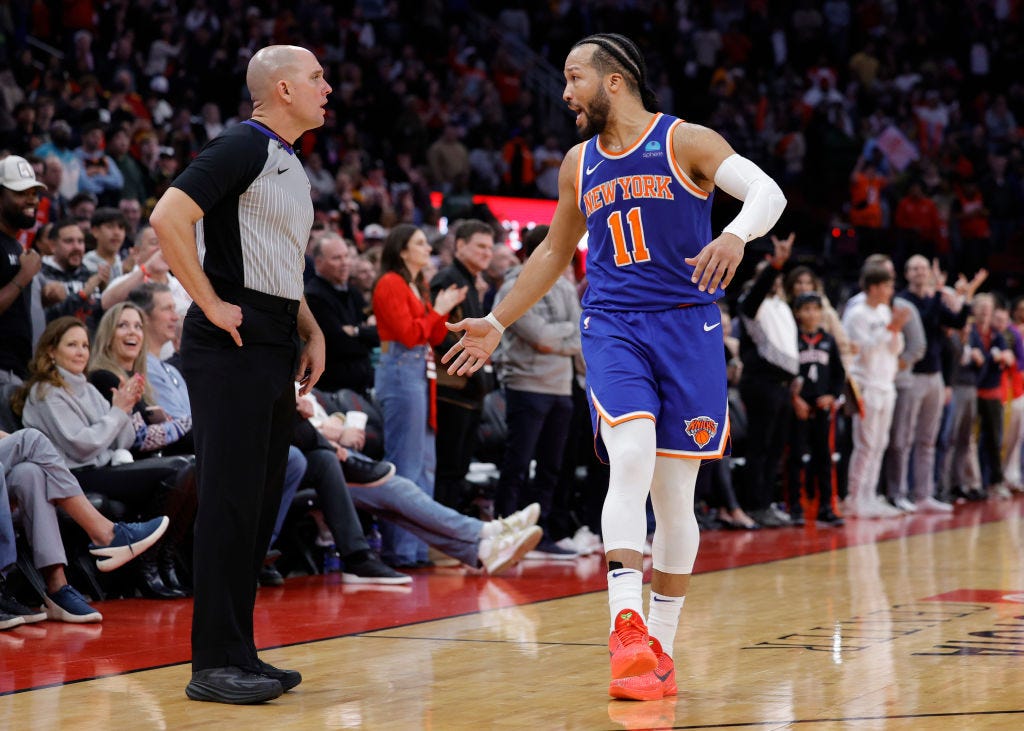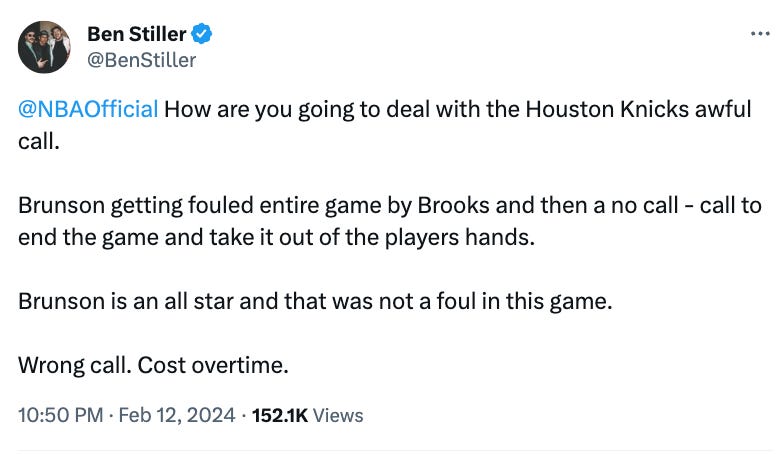Which team is hurt most often by late-game blown calls? On subjectivity and the last-second gaffe that cost the Knicks
In light of the New York Knicks loss, a break down the NBA's Last 2 Minute Reports.

Tom Thibodeau had some choice words for the referees after they walked off the floor. And with good reason.
Ed Malloy, the crew chief for Monday’s game between the New York Knicks and Houston Rockets, admitted after the game that a foul should not have been called on Jalen Brunson in the closing second.
Brunson contested Aaron Holiday’s 3-point shot at the buzzer and referee Jacyn Goble blew his whistle, giving Holiday three free-throws in a time game. The Knicks had already used their coach’s challenge (and lost) so the call couldn’t be challenged to Secaucus. Holiday made two free throws and the Rockets won.
Kudos to Malloy for fessing up on the referee crew’s behalf. That’s not a normal occurrence. Malloy inferred that Goble missed the call, without calling him out by name. Per the pool report, the Brunson contact was determined to be “incidental and marginal” after a postgame review by the officials.
Subjectivity vs. Objectivity
We like to think that officiating is an objective endeavor, but Malloy points to the level of subjectivity involved. Yeah, there was contact but it didn’t affect the shot. How could you know? Where’s the line? It was Goble’s opinion at the time that it wasn’t marginal and he blew the whistle. And his opinion was evidently overruled by his crew chief, Malloy, after the game.
I intentionally use the word opinion. Earlier this season, Zach Zarba, a Finals official, spoke to Sarah Todd of the Desert News after a controversial call in the Phoenix-Utah game. In his explanation, Zarba notably used the word “opinion” twice when justifying the officials’ ruling.
“In our opinion, there was clear and conclusive evidence that Durant made legal contact to the basketball blocking the shot first. That’s why the challenged was ruled successful.”
When asked a follow up about the landing space, Zarba responded:
“Yes, we reviewed both of those aspects of the play. But the clear and conclusive evidence that Durant got to the basketball first was the key here. Making everything after it marginal in our opinion.”
There’s that pesky thing called subjectivity. Talking to team staffers around the league, the blurry line between what’s considered marginal (legal) and illegal moves around inconsistently, making it difficult to trust the L2M reports that try to strip away opinion from facts. But as Zarba reiterated, so much of officiating is a matter of opinion, a subjective view of where marginal contact crosses over into illegal contact.
I bring this up because I listened to Rob Perez aka Worldwide Wob’s postgame talk which he, bless his heart, does for every Knicks game. I thought Rob was going to rip into the officials and protest to the basketball gods for the Brunson call.
But to my surprise, he didn’t.
He took a big-picture view, arguing that, by the book, Brunson fouled him and Perez said that’s the problem. Perez took issue with the rulebook that overly protects shooters and also criticized the NBA’s unending let’s-go-to-the-monitor chase for perfection at the expense of the entertainment product.
I’d venture to say that Perez watches more NBA than just about anyone on the planet. As a die-hard Knicks fan, he would certainly have reason to have an ax to grind after watching that game slip between his Knickerbockers’ hands.
But even Perez can’t figure out what’s considered marginal or what’s illegal. Perez sided with Goble and then, a few minutes after Perez published his take, Malloy sided with Thibodeau and the Knicks who argued it was marginal contact. Marginality is in the eye of the beholder.
What happens now?
Never shying from hyperbole, Kendrick Perkins went on ESPN and called it one of the worst calls in NBA history. Not alone, Knicks superfan Ben Stiller was none too pleased by the officiating and called on the NBA to take action:
I chuckled at Stiller’s assertion that Brunson should get star treatment now. After all, what’s the point of making an All-Star team if you can’t get All-Star calls?!
Since Stiller asked the question at the top, I’ll answer it: the NBA will deal with it by having its game reviewers look at the calls and assess their accuracy for the Last 2 Minute report. After that, the call-by-call accuracy will be published on the L2M the following day (Tuesday evening, in this case). And the news cycle will move on. It always does. Until the next controversy. Rinse and repeat.
What action can the league take? The league, per their internal policy, doesn’t announce punishments or disciplinary action of its officials when they make mistakes, though I’m told it happens so rarely that fans/teams/players probably wouldn’t be satisfied anyway.
Unless the league determines that Jacyn is routinely blowing calls to such an extreme level that the incompetency requires disciplinary action (doubtful), I suspect that this will simply go into his file when the league chooses which officials get promoted into the playoffs and and subsequent rounds. Jacyn has been selected by the NBA to be a playoff official in each of the last three years, though not a Finals referee like his older brother John.
If Jacyn indeed makes the playoff roster again, one could say that the high-profile mistakes were considered marginal. If you will.
The L2M Standings
The NBA doesn’t release their grades for every call and every official. Only the calls/no-calls in the Last 2 Minute report are publicized to the masses. I do find it interesting that the NBA doesn’t name the referee who is charged with an incorrect call or incorrect no call (or credited with getting it right). In the box score, if a player makes a turnover, you know it. When a coach gets called for a technical, his name is published in the official box score. But when the league determines an official missed a call, the name is omitted from the public record.
I’d imagine that was negotiated between the NBA and the referee union when they discussed their compensation package in collective bargaining. Something like, OK, as part of our increased pay, we’ll let you publish the L2Ms but leave our names out of it, yeah?
I’d be willing to bet that, in the L2M, the league stands by Malloy’s postgame assessment and admits that Jacyn missed the call. (Again, they won’t call him out by name in the published report). Jacyn was the same official that a year ago blew the call in the infamous Celtics-Lakers game, prompting Patrick Beverley to bring out the camera. That’s rough. Which giant legion of fans is more vicious, Knicks fans or Lakers fans? The answer is yes.
The NBA knows which referees are most accurate, but that data is protected in the proverbial black box. The grades are used, in part, to decide which officials make the playoff roster and advance in the postseason. If you hope to one day see the referees grades housed in that black box, I wouldn’t hold my breath. The league’s interest in transparency only goes so far.
(I will say that it’s appreciated here that the NBA keeps its archives up on their official site and allows the public to review their reviews. I’m not sure every league does this, but it doesn’t go unnoticed.)
So, we do have the L2M report. And thanks to data compilation by Robert/@atlhawksfanatic, we can break down which teams get helped or hurt the most by officials in these one-possession games in the final two minutes.
A reminder: paid subscribers to The Finder receive edgy NBA referee analysis/content you won’t find anywhere else including:
Was Gobert right? The Cold, Hard Data on Draymond’s Ejections
And much, much more!
OK, before we dive in, a few caveats here:
This is only one small slice of an NBA game. There are 46 other minutes in a game that could even or stretch these disparities out. To that point, a third foul call on a player in the opening minutes of a game could have more impact on the game outcome than some of these calls in the L2M.
The reviews are not independent. Internal auditors at any company — paid by their bosses to hold bosses accountable — carry obvious conflicts of interest. (And sometimes those conflicts can lead cheating, which, in one recent high-profile case, resulted in a $100 million penalty by the SEC.) Just something to keep this in mind as we go through the data.
Not all missed calls are equal. The Goble/Brunson kicked call was a death blow. It came in a feverishly high-leverage moment, the final second of a tie game in the fourth quarter. Even more, it resulted in the most costly missed call: a three-shot violation, giving the Rockets three tries to take the lead and extend it. Other calls in the L2M barely move the needle on the outcome (like, say, when the league says a foul was correctly called, but on the wrong player. Doesn’t really change much except in some small cases when a player would be DQ’d). Nevertheless, each call is treated the same in the table below.
So which teams have been disproportionately hurt by officials in the L2M report?
Let’s take a look.



